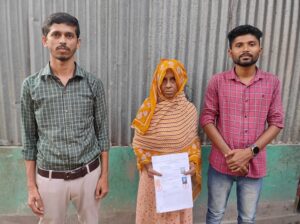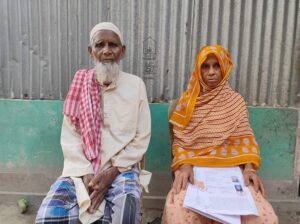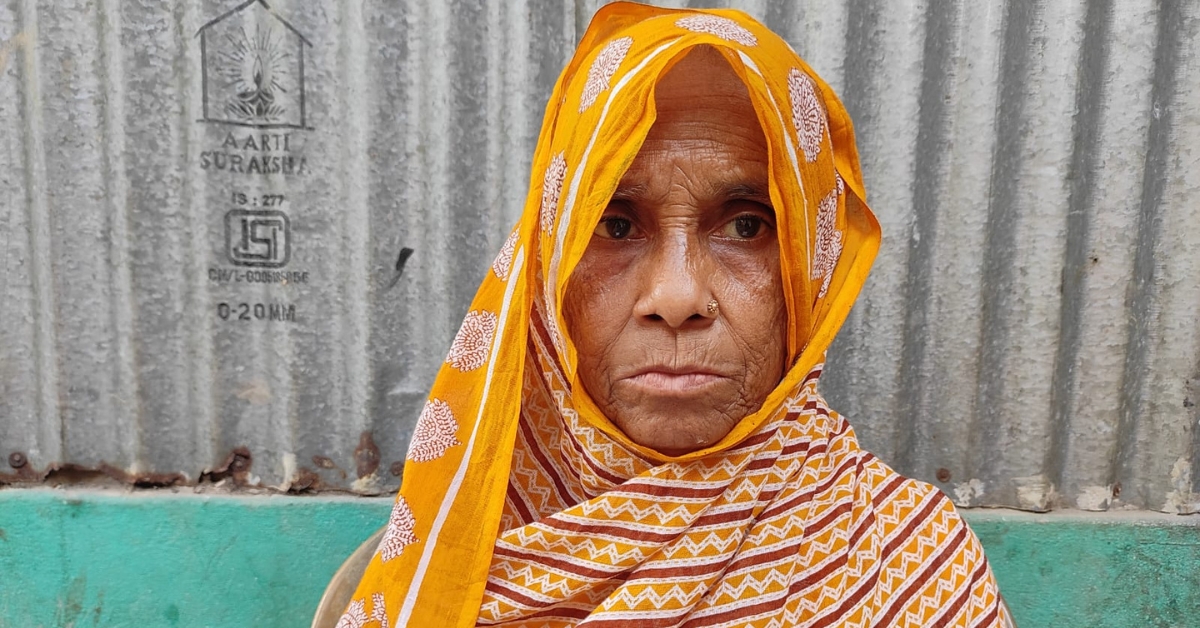“I pray that you all can help other people too.” These were the words of Alijon Bibi, spoken in the Deshi dialect, as she held the Tribunal judgment that restored her dignity and declared her an Indian citizen. Her prayer was not only for herself, but for the countless others in Assam living under the threat of statelessness. On April 8, 2025, Assam legal team of Citizens for Justice and Peace (CJP) visited Alijon Bibi’s home to deliver the news: after nearly two decades of struggle, she was no longer a suspected foreigner.
This is the story of resilience, legal perseverance, and an unjust system that continues to persecute the marginalised on the basis of ‘doubt’.
Background: Suspicion cast on a woman born in independent India
Alijon Bibi, a Muslim woman born on February 25, 1955 in Gopalerkuti village, Coochbehar district, West Bengal, was referred to the Foreigners Tribunal (FT) in Assam in 2004 under the Illegal Migrants (Determination by Tribunals) Act, 1983. She had moved to Assam after marrying Rahman Ali from Boromera village, Dhubri district, approximately 53 years ago. Despite having lived, voted, and raised five children in Assam, she was labelled a “doubtful voter” and suspected of being an illegal Bangladeshi migrant. The reference continued even after the IMDT Act was struck down in 2005 and was re-registered as FT-10/AGM/2297/2020 under the Foreigners Act, 1946.
The Tribunal notice sent to Alijon Bibi tore through her family’s life. Sheikh Alimuddin, father of Alijon, was 31 years old when India gained independence, yet decades later, his daughter was being persecuted as an illegal foreigner. She had voted in Assam since 1985, yet the stigma of being suspected as a foreigner was unbearable. The social repercussions were equally severe—her son, a respected Mufti at the local mosque, began facing questions. The family requested CJP not to disclose the case to their neighbours for fear of social ostracisation. Their dignity had come under attack.
For a woman whose father had voted in Indian elections in 1966 and owned ancestral land in West Bengal, it was a cruel irony to be forced to prove her belonging in her own country.

CJP Assam Team with Alijon Bibi
Mounting the Defence: CJP’s tireless efforts
From the moment CJP took on her case, it became a meticulous process of documentation, field visits, and advocacy. CJP’s para-legal team, especially Dhubri’s District Volunteer Motivator (DVM) Habibul Bepari, tracked down her family history and vital records in both Assam and West Bengal. CJP’s advocate, Mr. Iskandar Azad, and team conducted extensive follow-ups with government offices to collect original documents and arrange witnesses.
One of the biggest hurdles was securing witnesses from West Bengal—an entirely different state—to testify in an Assam court. Repeated visits were made to the Pradhan’s house in Balabhut Gram Panchayat to convince him to appear before the Tribunal. This logistical nightmare illustrates how citizenship battles can be stacked against the poor and marginalised.
Legal arguments and documentary evidence presented
In her written statement and oral testimony, Alijon asserted that she was a citizen of India by birth. She supported her claim with the following:
Primary legal evidence:
- Voter list of 1966 (Ext A): Proved her father Sekh Alimuddin was a registered voter under Tufanganj constituency, West Bengal. This document was authenticated by the Director of the Directorate of State Archives, Government of West Bengal, who confirmed it was genuine.
- Land records (Ext C): Certified copy of land in her father and uncles’ names—prepared in 1955—proving their residence and landholding before January 1, 1966.
- Multiple voter lists (Ext D, E, M, N): Her name appeared in Assam voter rolls from 1985, 1997, 2010, and 2022 alongside her husband and children, showing continued residence.
- Identity documents (Ext G, H, I): Voter ID, Aadhaar card, PAN card—supporting evidence of Indian identity and address.
- Brother’s testimony (DW-2): Mojammel Hoque corroborated her family background and origin. He submitted his own verified voter ID, Aadhaar, and PAN details as additional linkage evidence.
- Official witnesses:
- DW-3: Head Clerk of Block Land and Land Reforms Officer, Tufanganj, who authenticated Ext C.
- DW-4: Gram Pradhan from Balabhut Gram Panchayat confirmed earlier issuance of linkage certificate (though it was ultimately not relied upon due to documentation gaps).
Tribunal’s Finding: Not a foreigner
After reviewing all documents and depositions, the Tribunal noted:
- The 1966 voter list and 1955 land records proved her father’s Indian citizenship.
- Her own presence in voter rolls since 1985 confirmed continuous residence and civic participation.
- No rebuttal evidence was offered by the state; the referral authority itself had noted that she did not appear to be a foreigner.
The Tribunal concluded by holding Alijon Bibi to be a citizen of India.
Broader Implications: Citizenship trials and structural injustice
Alijon’s case is emblematic of the deeply flawed citizenship determination process in Assam. Despite clear documentary proof and a history of voting in Indian elections, she was forced to prove her “Indianness” in a quasi-judicial proceeding lasting nearly two decades.
This process places an unfair evidentiary burden on the accused, often the poor, rural, and marginalised, while the state is not required to prove its claims. Women like Alijon, who move to another state after marriage and often lack birth certificates, are especially vulnerable.
Despite societal stigma and bureaucratic hurdles, Alijon and her family now speak openly, hoping their story will inspire others to resist. On April 8, when CJP state in-charge Nanda Ghosh, Dhubri’s DVM Habibul Bepari and office driver Asikul Hussain went to Alijon’s house to handover the FT order, she told the CJP team:
“Allah gives you strength to be with poor people. I’ll pray to Allah.”

Alijon Bibi sits holding the order that proves her citizenship along with her husband out their home
Her recognition as an Indian citizen is not just a personal triumph, but a powerful indictment of a system that continues to cast suspicion on its most vulnerable. It is a reminder that legal advocacy, community support, and collective resolve can still defeat institutional injustice.
The order may be read here.
Related:
CJP Triumph: Bipul Karmakar wins citizenship battle after a two-year struggle
SC: Only 10 deported, 33 of 63 contest foreigner status from the Matia Transit Camp, Assam
Relentless Pursuit of Justice: CJP’s Advocacy for Citizenship Rights in Assam
CJP triumphs in securing bail for Assam’s Sahid Ali: A step towards restoring citizenship

